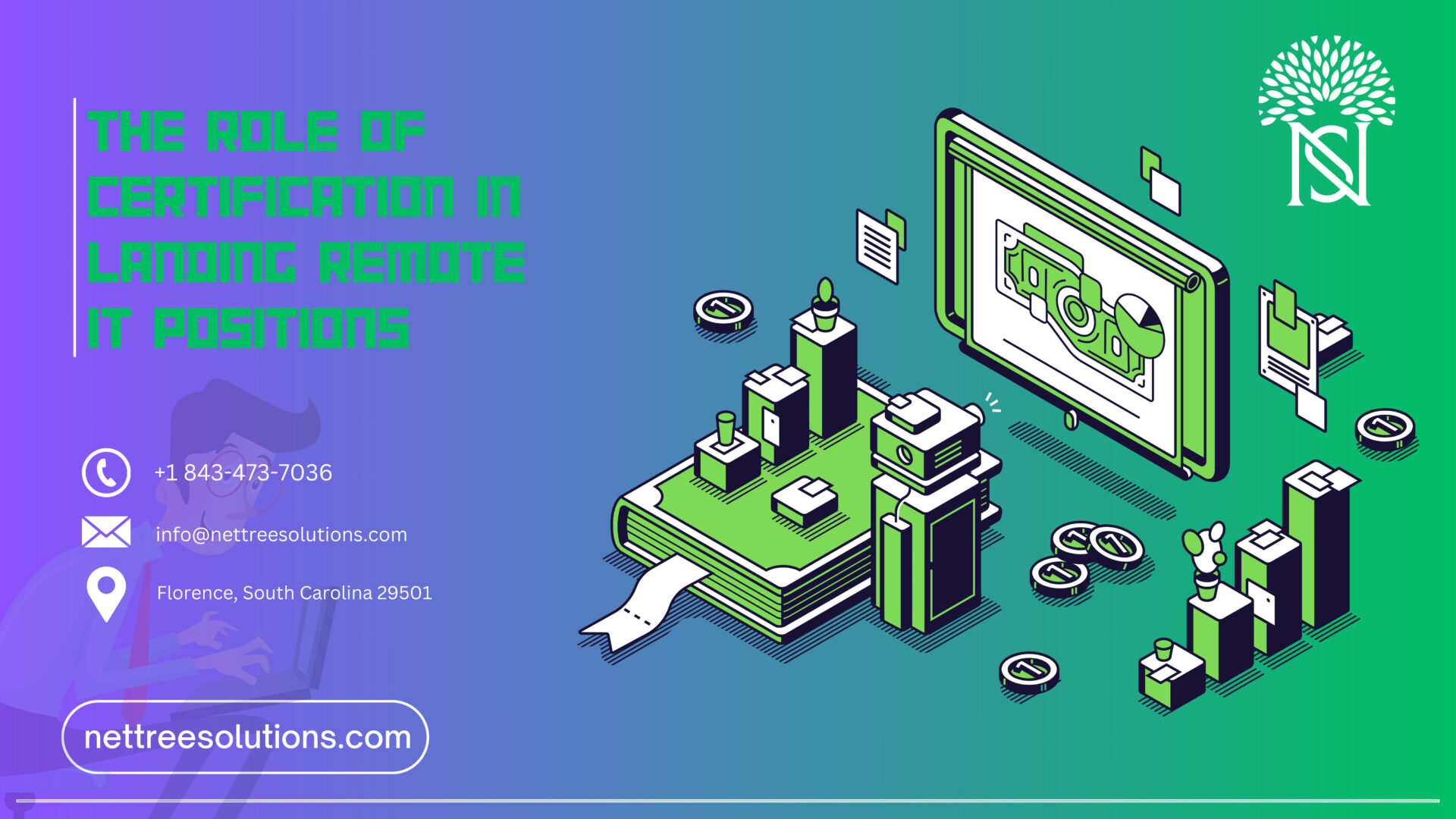The work landscape has transformed post-pandemic, pushing remote work to the forefront of the employment paradigm. As this shift towards remote positions continues, the demand for skilled IT professionals who can operate effectively in virtual environments has skyrocketed. This shift isn’t limited to any particular industry; it spans across sectors, from tech giants to healthcare providers, making it clear that work related to remote positions is here to stay. The remote work revolution has brought about a more flexible work environment and opened up a world of opportunities for IT professionals, enabling them to work with companies from around the globe without geographical constraints. It has truly become a global job market for those in the tech field.
However, while jobs related to remote it positions have their advantages, employers are becoming increasingly discerning in their hiring processes for professionals looking for remote positions. They recognize the importance of specific skill sets, adaptability, and reliability in the work related to remote positions. Thus, they are keen on hiring individuals who can meet these criteria. IT certifications provide a vital bridge in this scenario. They serve as tangible proof of your competence and expertise in various IT domains, reassuring employers that you possess the necessary knowledge and skills to excel in a work environment facilitated by remote positions. Whether cybersecurity, cloud computing, network administration, or any other IT specialization, certifications can bolster your resume and distinguish you as a valuable candidate in the competitive job market
Demonstrating Expertise and Commitment for gaining valuable offers for remote it positions

IT certifications play a pivotal role in showcasing your expertise in specific technology areas. They serve as tangible proof of your proficiency, assuring potential employers that you possess the requisite skills for remote IT positions. Moreover, these certifications go beyond mere qualifications; they signify a commitment to professional growth. In a field where technological advancements occur at a rapid pace, the commitment to obtaining and maintaining certifications demonstrates your adaptability and dedication to staying current in the face of industry evolution.
The Competitive Edge to gain for remote it positions

In the competitive landscape of remote work, where geographical boundaries are blurred, having IT certifications on your resume provides a distinct advantage. Certifications such as CompTIA A+, CompTIA Network+, CCNA, and AWS Certified Solutions Architect – Associate stand out as recognizable benchmarks in the industry. Employers seeking remote IT professionals often use certifications as a quick reference point to identify qualified candidates. By investing in these certifications, you position yourself ahead of the competition, increasing the likelihood of securing interviews and ultimately landing desirable remote IT roles.
Future-Proofing Your Career by selecting the in-demand jobs related to remote it positions

The dynamic nature of the IT industry demands continuous learning and adaptability. IT certifications not only validate existing skills but also serve as a gateway to ongoing education. Professionals holding certifications are more likely to engage in further training and skill development to stay abreast of emerging technologies. This commitment to continuous learning not only enhances your professional value but also future-proofs your career, ensuring that you remain relevant and sought after in an ever-changing remote work landscape.
How IT Certifications Can Help You Land Remote IT Positions

There are several ways in which IT certifications can help you land a remote IT positions:
- They demonstrate your expertise in specific technology areas: IT certifications are a tangible way to showcase your skills to potential employers. By earning certifications in relevant technologies, you can demonstrate your proficiency in the skills required for the remote IT positions you are applying for.
- They give you a competitive advantage in the job market: IT certifications are in high demand, making certified professionals highly sought-after by employers. When applying for remote IT positions, having IT certifications on your resume can make you stand out from the crowd and increase your chances of getting an interview.
- They establish your credibility: Trust is paramount in remote work settings, and IT certifications can help to establish your credibility as a qualified and competent professional. By earning certifications from reputable organizations, you can show potential employers that you are committed to your career and have the skills and knowledge necessary to be successful in a remote role.
- They validate your skills: IT certifications are aligned with industry standards, providing assurance to employers that you have the skills and knowledge required to perform the job. This is especially important in remote work settings, where employers cannot physically observe your work.
- They promote ongoing learning: IT certifications are not just one-time achievements. They require ongoing learning and maintenance to stay up-to-date with the latest technologies and industry trends. This commitment to continuous learning shows potential employers that you are passionate about your career and dedicated to developing your skills.
- They offer global recognition: IT certifications are recognized by employers worldwide, making them a valuable asset in the global job market. This is especially beneficial for professionals targeting remote it positions, who may be working for clients or employers in different countries.
Beyond showcasing specific skills, IT certifications offer multifaceted advantages in the pursuit of remote IT positions. One key benefit is the competitive advantage they confer in the job market. As organizations increasingly prioritize digital proficiency, certified IT professionals stand out as valuable assets. In the realm of remote work, where the pool of candidates may be global, having certifications becomes a distinguishing factor that captures the attention of employers. Certifications signify a commitment to staying current in a rapidly evolving field, demonstrating to employers that you are not only equipped with relevant skills but also proactive in adapting to emerging technologies.
Furthermore, IT certifications play a pivotal role in establishing credibility in remote work settings. Trust is foundational in virtual collaborations, and certifications act as a trust-building tool. When potential employers see certifications from reputable organizations on your resume, it serves as an assurance of your competence and dedication. This is particularly crucial in remote IT positions where face-to-face interactions are limited, and employers must rely on documented evidence of expertise.
The validation aspect of IT certifications is especially pertinent in remote work scenarios. Employers, unable to physically observe daily operations, depend on certifications aligned with industry standards to validate the skills claimed by candidates. This validation instills confidence, assuring employers that you possess the necessary competencies to excel in a remote IT role. In essence, IT certifications act as a reliable third-party endorsement of your capabilities, helping bridge the gap between physical separation and professional trust in the virtual workspace.
Choosing the Right IT Certification

When choosing an IT certification, it is important to consider your career goals and specific IT fields. Some of the most popular IT certifications include:
- CompTIA A+ : This entry-level certification provides a foundation in IT fundamentals, including hardware, software, networking, and security.
- CompTIA Network+ : This intermediate-level certification focuses on networking technologies and concepts.
- CCNA : This Cisco-branded certification validates your skills in designing, implementing, and maintaining Cisco networks.
- AWS Certified Solutions Architect – Associate : This certification validates your ability to design and deploy AWS-based solutions.
- Microsoft Certified: Azure Solutions Architect Expert : This certification validates your ability to design and implement Azure-based solutions.
Selecting the right IT certification is a crucial step in aligning your skill set with your career objectives. CompTIA A+ is an excellent starting point for those entering the IT field, offering a comprehensive understanding of fundamental concepts such as hardware, software, networking, and security. This entry-level certification acts as a solid foundation, equipping individuals with the basic knowledge required for a variety of IT roles. Moving to the intermediate level, CompTIA Network+ is a valuable certification that delves deeper into networking technologies and concepts, making it suitable for those looking to specialize in network administration or support roles.
For individuals interested in networking specifically within the Cisco ecosystem, the CCNA (Cisco Certified Network Associate) certification is highly regarded. It validates skills in designing, implementing, and maintaining Cisco networks, making it an essential credential for professionals aspiring to work with Cisco technologies. Similarly, those aiming to work with cloud computing can explore certifications such as AWS Certified Solutions Architect – Associate and Microsoft Certified: Azure Solutions Architect Expert. These certifications focus on designing and deploying solutions within Amazon Web Services (AWS) and Microsoft Azure environments, respectively. Given the increasing prevalence of cloud technologies, these certifications are particularly valuable for individuals pursuing roles related to cloud architecture and management.
Navigating the array of available certifications can be overwhelming, especially for those new to the IT field. Seeking guidance from a career counselor or experienced IT professional can provide invaluable insights. These experts can assess your existing skills, career aspirations, and industry trends to recommend the most relevant certification for your goals. Additionally, considering the evolving nature of the IT landscape, staying informed about emerging certifications and technologies is essential for long-term career growth. Regularly updating your skill set through continuous learning and relevant certifications ensures that you remain competitive and adaptable in the ever-changing world of IT.
Tips for Landing Jobs in Remote IT Positions

In addition to earning IT certifications, there are a few other things you can do to increase your chances of landing jobs in remote IT positions:-
Cultivate a Robust Online Presence

In the digital age, building a strong online presence is paramount for professionals seeking remote IT positions. Beyond certifications, a well-curated LinkedIn profile and a personal website or blog can serve as dynamic platforms to showcase your skills, projects, and industry insights. Regularly updating these profiles with relevant achievements and engaging content not only provides potential employers with a comprehensive view of your capabilities but also demonstrates your commitment to staying connected and relevant in the virtual professional space.
Harness the Power of Networking

Networking remains a cornerstone in the journey toward remote IT success. Actively participate in industry events, both virtual and in-person when possible, to connect with fellow IT professionals. Platforms like Nettree Solutions offers a virtual space to engage in discussions, share knowledge, and foster professional relationships. Networking not only broadens your knowledge base but can also unveil new job opportunities and provide valuable referrals. The interconnected nature of the IT community makes networking a strategic avenue for staying informed about industry trends and potential remote IT positions.
Craft Tailored Resumes and Cover Letters

While certifications serve as a powerful initial impression, customizing your application materials further solidifies your candidacy for remote IT positions. Tailor your resume and cover letter for each job application, emphasizing the specific skills and experiences that align with the position’s requirements. Clearly articulate how your background uniquely qualifies you for remote work, showcasing adaptability, self-motivation, and effective communication skills. This personalized approach signals to employers that you’ve invested time and thought into understanding the nuances of each role, increasing the likelihood of standing out among applicants.
Prepare for Remote Interviews

Interviews for remote IT positions can differ significantly from traditional in-person interviews. Beyond technical questions, be prepared to discuss your remote work experience, your ability to manage time effectively, and your proficiency with remote collaboration tools. Practice answering common remote-specific interview questions to articulate your comfort and expertise in a virtual work environment. Additionally, ensure that your internet connection is reliable, and your video conferencing setup is optimal. Being well-prepared for the unique aspects of remote interviews demonstrates your readiness to excel in the evolving landscape of remote IT positions.
In summary, while IT certifications lay a solid foundation, augmenting your approach with a strong online presence, active networking, tailored application materials, and interview preparedness elevates your prospects in the competitive realm of remote IT positions. These supplementary efforts not only complement your technical skills but also showcase your commitment to professional excellence and success in the virtual workspace.
Conclusion

IT certifications can play a crucial role in helping you land jobs in remote IT positions. By demonstrating your expertise in specific technology areas, IT certifications can give you a competitive advantage in the job market, establish your credibility, and validate your skills.
In the era where people are competing for remote it positions, IT certifications are more important than ever before. They serve as a symbol of trust and competence, significantly increasing your chances of securing rewarding job roles through remote it positions.








